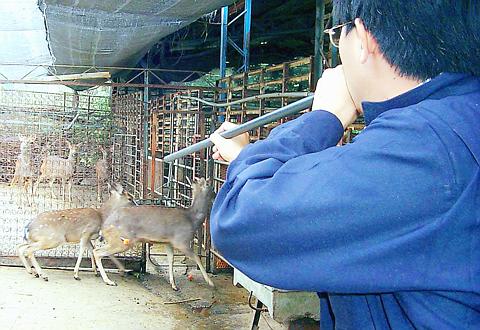Citing the results of tests yesterday, officials at the Council of Agriculture announced that the latest outbreak of deadly foot-and-mouth disease (FMD) has been contained to one farm in Changhua County. The statement came in the face of reports yesterday that claimed the outbreak had spread from a dairy goat farm -- where it forced the slaughter of over 200 animals on Wednesday -- to other farms in the county.
Sung Hua-tsung (宋華聰), deputy director of the council's animal quarantine department, said yesterday that "no trace of the disease" had been found after investigating conditions at two farms in Homei and Shenkang townships.
Earlier yesterday, local agriculture officials rejected reports of the disease spreading as "rumors," but acknowledged that local health authorities were investigating the farms.

PHOTO: CHIU YI-FEIN
Still, officials ordered goat markets in two southern counties to close operations for a week while the checks continue.
Over 200 dairy goats had to be killed at a farm in Changhua's Fanyuan township on Wednesday following the deaths of 22 others from the deadly livestock disease.
This reappearance of FMD -- the first to affect Taiwan's goat population -- follows outbreaks of the disease less than a month ago on cattle farms in Yunlin and Chiayi counties.
Sung said FMD had not spread to any of the 30-odd cattle, hog, goat or deer farms within the 3km quarantined radius around the Fangyuan farm.
The virus does not affect humans, so goat meat and milk are both safe, Sung said.
Animal quarantine department director Li Chin-lung (
The COA said yesterday that the O-Kinmen strain of the virus -- the same as the one which struck cattle in last month's outbreak -- was introduced to Taiwan by smuggled animals or meat products from China. It was then brought into Changhua County by someone transporting an infected animal, they said.
Humans are particularly effective transmitters of the virus as they can carry it in their nostrils for seven days, said Sung.
For the second time in a month, the Council has ordered all cloven-hooved animals in Taiwan immunized against FMD.
Council chairman Lin Shiang-nung (
Over 90 percent of the pig and cattle populations across the nation have already been immunized against the disease, he told reporters yesterday morning.
Only 60 percent of goats and 40 percent of deer have been immunized, making these animals more vulnerable to the disease, Lin said.
The council is also getting tough, however. It said yesterday that farmers whose stock is infected with FMD and who have not immunized their stock may be subject to a fine of NT$50,000.
Meanwhile, the outbreak may seriously affect goat prices and goat products as public fear of the virus sets in.
Goat markets in Kaohsiung and Yunlin counties have been suspended for the next week. They plan to open again on Feb. 24, but may extend their closing time depending on the progress of the outbreak.
The FMD virus inflicted heavy losses on Taiwan's pork industry in March 1997 when more than half of the nation's estimated 7 million pigs were slaughtered.

SECURITY: As China is ‘reshaping’ Hong Kong’s population, Taiwan must raise the eligibility threshold for applications from Hong Kongers, Chiu Chui-cheng said When Hong Kong and Macau citizens apply for residency in Taiwan, it would be under a new category that includes a “national security observation period,” Mainland Affairs Council (MAC) Minister Chiu Chui-cheng (邱垂正) said yesterday. President William Lai (賴清德) on March 13 announced 17 strategies to counter China’s aggression toward Taiwan, including incorporating national security considerations into the review process for residency applications from Hong Kong and Macau citizens. The situation in Hong Kong is constantly changing, Chiu said to media yesterday on the sidelines of the Taipei Technology Run hosted by the Taipei Neihu Technology Park Development Association. With

CARROT AND STICK: While unrelenting in its military threats, China attracted nearly 40,000 Taiwanese to over 400 business events last year Nearly 40,000 Taiwanese last year joined industry events in China, such as conferences and trade fairs, supported by the Chinese government, a study showed yesterday, as Beijing ramps up a charm offensive toward Taipei alongside military pressure. China has long taken a carrot-and-stick approach to Taiwan, threatening it with the prospect of military action while reaching out to those it believes are amenable to Beijing’s point of view. Taiwanese security officials are wary of what they see as Beijing’s influence campaigns to sway public opinion after Taipei and Beijing gradually resumed travel links halted by the COVID-19 pandemic, but the scale of

A US Marine Corps regiment equipped with Naval Strike Missiles (NSM) is set to participate in the upcoming Balikatan 25 exercise in the Luzon Strait, marking the system’s first-ever deployment in the Philippines. US and Philippine officials have separately confirmed that the Navy Marine Expeditionary Ship Interdiction System (NMESIS) — the mobile launch platform for the Naval Strike Missile — would take part in the joint exercise. The missiles are being deployed to “a strategic first island chain chokepoint” in the waters between Taiwan proper and the Philippines, US-based Naval News reported. “The Luzon Strait and Bashi Channel represent a critical access

Pope Francis is be laid to rest on Saturday after lying in state for three days in St Peter’s Basilica, where the faithful are expected to flock to pay their respects to history’s first Latin American pontiff. The cardinals met yesterday in the Vatican’s synod hall to chart the next steps before a conclave begins to choose Francis’ successor, as condolences poured in from around the world. According to current norms, the conclave must begin between May 5 and 10. The cardinals set the funeral for Saturday at 10am in St Peter’s Square, to be celebrated by the dean of the College